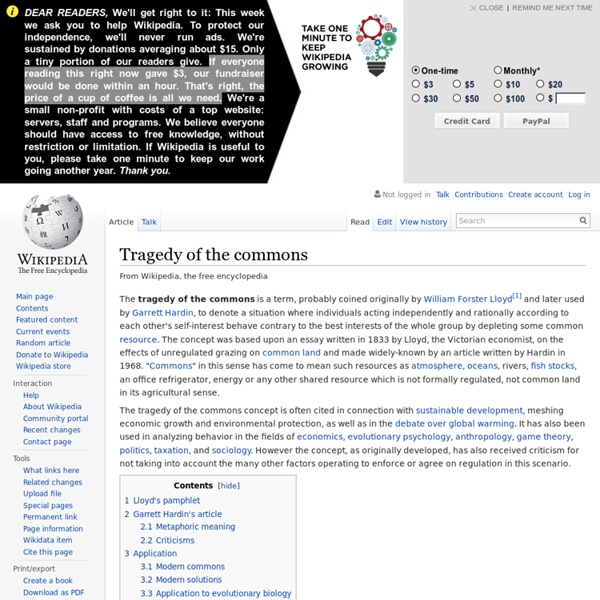ScienceGuide: Transition or hell?
22 januari 2014 - The ‘Science in Transition-debate’ continues. At Maastricht University and elsewhere in academia. Are solutions dawning?
Ming the Mechanic: Ten incredible things we get for free
by Flemming Funch Life2.0: Here are 10 wonderful things that just seem to happen by themselves: • Diversity & Harmony • Connection & Friendship • Self-organisation & Synergy • Resonance & Synchronicity • Insight & The spread of great ideas • Emergence & Paradigm Shifts • Learning & Growth • Happiness & Flow • Healing & Forgiveness • Relaxation & Enlightenment Not a bad list is it?
A Short History of Enclosure in Britain
Over the course of a few hundred years, much of Britain's land has been privatized — that is to say taken out of some form of collective ownership and management and handed over to individuals. Currently, in our "property-owning democracy", nearly half the country is owned by 40,000 land millionaires, or 0.06 per cent of the population,1 while most of the rest of us spend half our working lives paying off the debt on a patch of land barely large enough to accommodate a dwelling and a washing line. There are many factors that have led to such extreme levels of land concentration, but the most blatant and the most contentious has been enclosure — the subdivision and fencing of common land into individual plots which were allocated to those people deemed to have held rights to the land enclosed. Those of us who have not spent a lifetime studying agricultural history should beware of leaping to convenient conclusions about the past, for nothing is quite what it seems. The Open Field System
Global commons 'If we don't care for it, the vitality of the Earth will be destroyed'
Like his more famous Jesuit boss (Pope Francis), Father Albert Fritsch believes caring for the Earth and addressing the consequences of climate change are urgent moral and religious issues. Fritsch has dedicated much of his life to environmental work, through his website, Earth Healing, and his work with advocacy groups in both Washington, DC, and rural Kentucky, where he grew up on a farm. “This is the deepest of the pro-life issues,” Fritsch says.
Science 2.0 consultation & status report Science in Transition
dinsdag 22 juli 2014 The European Commission opened a public consultation about Science 2.0 under the heading ‘Science in Transition’. The goal of the consultation is to better understand the full societal potential of ‘Science 2.0′ as well as the desirability of any possible policy action. “‘Science 2.0’ describes the on-going evolution in the modus operandi of doing research and organising science.
Category:Commons
= What we share. Creations of both nature and society that belong to all of us equally, and should be maintained for future generations. The Commons has the potential to replace the commodity as the determining form of re-/producing societal living conditions. Such a replacement can only occur, if communities constitute themselves for every aspect of life, in order to take „their“ commons back and to reintegrate them into a new need-focused logic of re-/production. [1]
Left2Right: How Not to Complain Against Taxes (II): Against Natural Property Rights
« previous post | Main | next post » January 20, 2005 How Not to Complain Against Taxes (II): Against Natural Property Rights Anderson on Political Economy, Anderson on Taxes, Elizabeth Anderson: January 20, 2005
6nov2014 Podiumartikel
fragment's from a secret KNAW-report "Contrary to the Rector Magnificus of Utrecht University , who initiated a few small-circle table for breakfast meetings in order to very slowly if not droplywise implement the above mentioned secret recommendations to modify the research procurement protocols of public universities with multinational corporations as laid down in the Public Private Partnership Policy and Guidelines , we as KNAW-LOWI needed to react with a simular but much broader initiative adressing not just the Dutch, but also on the European , if not The World , Research Communities. To do so effectively we had to find a international PR partner with a excellent track record within the world of academia.
Elinor Ostrom Debunks Tragedy of the Commons
Nobel Prize-winning economist Elinor Ostrom proved that people can—and do—work together to manage commonly-held resources without degrading them. posted Oct 27, 2009 The biggest roadblock standing in the way of many people’s recognition of the importance of the commons came tumbling down when Indiana University professor Elinor Ostrom won the Nobel Prize for Economics. Garrett Hardin described the Tragedy of the Commons with a hypothetical example of shared herding land: If all herders make the individually rational economic decision of increasing the number of cows they graze on the land, the collective effect will deplete or destroy the common. Over many decades, Ostrom has documented how various communities manage common resources—grazing lands, forests, irrigation waters, fisheries—equitably and sustainably over the long term. Garrett Hardin himself later revised his own view, noting that what he described was actually the Tragedy of the Unmanaged Commons.
The Right to Private Property
If one doubts that a political economic system rests on certain ethical precepts, the quotation from Peter Unger should help dispel the doubt. Suppose it is true, as Unger claims, that we are immoral if we do not “give away most of [our] financially valuable assets.” Indeed, more strongly put, suppose we are immoral if we do not support a system of law that requires this of us—that is what’s meant by saying we “must” give our wealth away. What sort of legal system follows from this?



